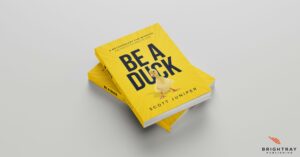Taylor Swift’s Eras Tour commemorative book hit retailers on Black Friday, and publishers everywhere were quick to pick up on one particular detail in the listing—that the book was not published by one of the traditional, “Big Five” book publishers that usually swipe up celebrity book deals with gusto. It was instead self-published under “Taylor Swift Publications.”
This is not totally shocking, as Taylor is “known to cut out the middleman,” one Atlantic article states. She did, after all, bypass Hollywood studios to issue her Eras concert movie directly to AMC theaters and rerecord her early albums after an ownership dispute with her old record label.
Taylor’s self-published memoir shines a spotlight on the shift that has taken place in the publishing industry: Self-publishing has flourished, with the number of self-published books increasing by 264% in the last five years.
Why the surge when traditional publishing is tried and true?
Self-publishing offers a host of attractive benefits—creative control, higher royalties, and faster time-to-market among them. It also empowers individuals and artists, shifting authority away from large, impersonal entities with “mother-knows-best” mentalities.
Still, self-publishing is not a venture everyone would willingly choose to navigate. As mentioned by Atlantic writer Lora Kelley, “Few stars, especially those merely looking to burnish their personal brand, will have the stamina or interest to source editors, lawyers, designers, proofers, rights specialists, and all of the other professionals required to create, distribute, and sell a book.”
It can be a costly endeavor in terms of both time and resources, and the learning curve is intimidating.
While Taylor Swift’s new book has a glowing, nearly five stars on the Target website, pouring over the reviews does reveal that it’s not without its imperfections. Some buyers report typos, grammatical blunders, blurry photos, and even photos of Taylor placed in the seam so the pop icon appears to be cut straight down the middle—errors that are not totally insignificant given the $39.99 price tag and have recently earned it the nickname the “Errors Tour” book.
While disappointing, it’s not enough evidence to balk at self-publishing—the benefits are just too numerous—but it does suggest that the time is ripe for publishers that bridge the gap between the independence of self-publishing and the support of traditional publishing: hybrid publishers.
Self-publishing has flourished, with the number of self-published books increasing by 264% in the last five years.
Hybrid publishing is the best of both worlds (Thank you, Miley Cyrus, for that bop). Included here are the seven major benefits of hybrid publishing that make it indispensable to the new, author-powered publishing landscape heralded by T-Swift:
Creative Control
Perhaps the most attractive benefit to a creative powerhouse like Swift, authors in a hybrid publishing model retain ownership of their work and have input on every aspect of their book, including cover, book title, content organization, images, biography, and description—meaning they can achieve their vision without pushback.
Editorial Support
Hybrid publishers like BrightRay Publishing provide developmental editing, line editing, copyediting, and proofreading—and tailor their editing services to fit each author’s unique needs. More eyes means less risk of typos and other errors going unnoticed. (Did you hear that, Taylor?)
Marketing Services
Many hybrid publishers include marketing services so authors don’t have to take on the daunting task alone—everything from branding and social media strategy to book launch support. Though admittedly not an issue for Taylor, this can drive sales and make the difference between a successful launch and one that is lackluster.
High-Quality Design
With the creative world at their fingertips, authors can work alongside their hybrid publisher to ensure professional book covers, interior layouts, and visual branding. At BrightRay, that means working with a variety of talented designers to achieve each client author’s desired look—blurry photos not included.
Expedited Timeline
Faster turnaround is another covetable perk. Since hybrid publishers provide individualized attention due to their smaller frontlists (when compared to big publishing houses) and more support than self-publishing, timelines are shorter. No more waiting on agent feedback or taking lengthy courses to master InDesign—you’ll follow a clear, established timeline to finish ahead.
Higher Royalties
With traditional publishers, authors typically take home around 10% of the royalties, but with hybrid publishers, authors usually retain 60–70% of the royalties. Not to brag, but that number is an enviable 100% with BrightRay.
Enhanced Credibility
Collaborating with an experienced team of professionals not only lends credibility to your work but also aligns you with other accomplished authors, adding both prestige and authority to your book. You might even say it improves your reputation. (Wink wink)
Taylor Swift’s choice to self-publish her Eras Tour book is a sign of times. Authors want control of their work, and it’s easier than ever to get their work in the hands of readers without the “helicopter parent” that is traditional publishing.
One thing remains true, however—collaboration always makes for a stronger book, and in Taylor Swift’s case, having experienced editors and designers on her side could have helped her book avoid the errors and bad press. And with a hybrid publisher, the starlet wouldn’t have lost an ounce of creative control.
If you’re interested in collaborating with BrightRay Publishing to bring your vision to life, schedule a call with us today.

Dannie is a seasoned editor with a passion for refining manuscripts. With a BA in English literature, certificates from the Editorial Freelancers Association and Poynter/ACES, and experience as an acquisitions editor, she brings a wealth of expertise to every project. Known for her keen eye for detail and approachable demeanor, she is dedicated to helping authors shine while fostering a friendly working environment.




